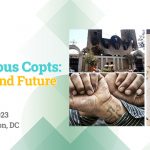By Raymond Ibrahim – Coptic Solidarity –
Despite some cosmetic dressing, “systematic restrictions on freedom of religion or belief remain in place in Egypt, including actively enforced blasphemy laws, non-recognition of certain religious communities, and severe restrictions on religious expression.”
This is according to a new report published earlier this month by the U.S. Commission on International Religious Freedom’s (USCIRF) concerning the current state of religious freedom in Egypt.
It noted a few advances that can only be seen as nominal or for “show” only. For example, “President El-Sisi has invited some religious minority leaders and groups to participate in drafting the personal status law and to join the government and civil society members in a National Dialogue.”
In fact, even a legal system as draconian as sharia (which Egyptian law, per Article 2, draws from) permits non-Muslim minorities (dhimmis) to govern their own communal affairs—which Egypt’s “personal status laws” fall under. As for a “national dialogue,” this is just more words.
An especially telling way that Egypt is more concerned about its public image than in securing the religious freedom rights of all its citizens is evident in its approach to non-Muslim places of worship. As the report notes, “In 2018, President El-Sisi declared preserving religious and cultural heritage sites a national priority as part of an effort to attract tourism and showcase Egyptian national identity.”
The key phrase here is “attract tourism.” To do this, the government has taken several steps to maintain, restore, and renovate several religious monuments, “specifically for Muslim, Christians, and Jewish communities.” As one example, the government has opened seven of 14 sites along the Holy Family Trail.
As the report notes, “Despite these restorations, however, most of the renovated sites no longer serve active religious communities. While the government has invested money in preserving old houses of worship, it has not taken steps to materially advance the current religious freedom of faith communities themselves.”
This has been especially the case concerning churches:
Leaders also expressed appreciation for government support in constructing new churches large enough to accommodate local communities and built to sufficient safety standards to mitigate the risk of fires, which have broken out in church buildings in recent years. However, while recently constructed churches demonstrate better structural integrity and safer capacity, their locations in newly designed, less-populated cities and neighborhoods keep many Christians from benefiting from them. Their construction has not alleviated the problems that congregations in many other parts of Egypt face, including inadequate infrastructure and an inability to obtain government approval for critically needed repairs. Such communities also face the ever-present specter of mob riots and assaults by members of neighboring Muslim-majority communities who object to church renovation or registration. The Church of the Virgin and St. Samuel in al-Beheira governorate has experienced all these challenges in recent months. It is overflowing in capacity as the sole church serving Copts in 17 villages, and during long-awaited roof repairs, it was attacked by intolerant villagers who indicated they do not want a church in the village. Consequently, local government agencies denied the church continued restoration work.
This, of course, is a normal pattern that has played out time and time again: whenever a church is legalized or repaired—or is merely rumored to be legalized or repaired—local Muslim mobs riot and attack Christians. Authorities frequently respond by appeasing the rioters and permanently sealing up the “offending” churches on the charge that they are “security risks” to the region.
Much of this is exacerbated by so-called “reconciliation sessions” that Copts are pressured to participate in after Muslims rise up and terrorize them and their churches. While the report acknowledges how these meetings further “disenfranchise” Christian victims of Muslim violence, a fuller explanation is warranted, as this is often the chief way that Copts are denied their legal rights:
As discussed in more detail here, after any given Muslim riot has fizzled out—typical causes for mob uprisings are rumors that churches are being built or renovated, or that a Copt is dating a Muslim woman—authorities arrive. Instead of looking for and arresting the culprits, they gather the leaders of the Christian and Muslim communities together in these so-called “reconciliation sessions.” During these meetings, Christians are asked to make further concessions to angry Muslims.
Authorities tell Christian leaders things like, “Yes, we understand it’s your right to build a church, but as you can see, the situation is volatile right now, so, for the time being, maybe you can walk to the church in the next town six miles away—you know, until things die down.”
Needless to say, things never “die down” or “return to normal.”
For the record, beaten and terrorized Christians regularly reject the idea of being placed into a room with their persecutors in mock reconciliations sessions that merely add insult to injury. But when they rebuff the authorities’ offer and demand their rights as citizens against the culprits, the authorities smile and say “okay.” Then they go through the village making arrests—except that most of those whom they arrest are Christian youths. Then they tell the Coptic leaders, “Well, we’ve made the arrests. But, just as you say so-and-so [Muslim] was involved, there are even more witnesses [Muslims] who insist your own [Christian] youths were the ones who began the violence. So, we can either arrest and prosecute them, or you can rethink our offer about having a reconciliation meeting.”
Under the circumstances, dejected Christians generally agree to the further mockery. What alternative do they have?
The report highlights several other problematic issues. For instance, the Egyptian government requires every citizen’s religious affiliation printed on their National ID cards, which leaves “all religious minorities vulnerable to exposure and potential discrimination.” Indeed, if every Egyptian citizen is equal under the law, why is it necessary to know their religious identity? By way of analogy, imagine if the U.S. government decided that every American citizen had to have their religious identity printed on their driver’s license and/or passport. What would that suggest?
Also noted were Egypt’s adoption laws, especially in the notorious case of “Baby Shenouda”—a boy who, as a newborn, was found abandoned in a church, adopted by a Coptic family, but then stripped from them by the government five years later, placed in an orphanage, and forcibly converted to Islam, including by having his Christian name, Shenouda, changed to a Muslim name, Yusuf.
It was only after much international bad press, petitions, and pressure on Egypt that, “In March 2023, prosecutors issued an order for Shenouda to be temporarily returned to the parents, citing an edict from Egypt’s Grand Mufti and a fatwa from the Grand Imam of al-Azhar.”
As with all of those churches and Christian sites that are renovated in the name of tourism, this hapless child appears to have been returned to his adoptive parents—“temporarily”—also for show, in the name of Egypt’s public image.
Finally, “The Egyptian criminal justice system continues to pose some of the most potent challenges to religious freedom in Egypt.” Many are arrested detained, and imprisoned “on the basis of religion of belief”:
Those accused of crimes often face egregious violations of due process, such as lack of access to a lawyer, denial of habeas corpus, detention without charges, unjust detention in solitary confinement, serial postponement of judicial hearings, and unjust travel bans following their release. Some, though not all, of these denials have targeted religious minorities… [S]tate security, prosecutors, and courts have continued investigation, arrest, detention, prosecution and, in some cases, conviction and sentencing on the basis of alleged breaches of the blasphemy law.
One telling example:
Patrick Zaki, a graduate student at the University of Bologna in Italy, was arrested in 2020 after publishing an article with personal reflections on religious discrimination against Copts in Egypt. Authorities released him after 22 months of detention but, for the next 1.5 years, placed him under an official travel ban and forced him to endure serial postponement of a judicial ruling in his case. When the Egyptian government refused to permit Zaki’s travel to Italy to defend his thesis, the University heard his defense and granted his degree in July 2023 via video link. On July 18, 2023, an emergency state security court sentenced Zaki to three years in prison and officials arrested him in court to return him to prison. The sentencing prompted an outpouring of international concern for Zaki’s status, including USCIRF’s statement at a congressional hearing on religious freedom. The following day, President El-Sisi pardoned Zaki and another high-profile prisoner of conscience.
Once again, the formula is clear: Christians and other religious minorities have their legal rights openly trampled on with impunity—until, that is, the international arena learns of and criticizes any of these individual cases, at which point Egypt does what it should have done from the start.
In summary, according to USCIRF,
[S]ystematic restrictions on freedom of religion or belief remain in place in Egypt, including actively enforced blasphemy laws, non-recognition of certain religious communities, and severe restrictions on religious expression. State security and the courts continue to arbitrarily detain and prosecute religious freedom advocates and members of religious minorities. Further, some government initiatives that appear to address specific religious minorities’ concerns have not significantly advanced religious freedom for Egyptians of all religious backgrounds….
As such, USCIRF maintains its recommendation that the U.S. Department of State place Egypt on the Special Watch List for engaging in or tolerating severe violations of religious freedom. The U.S. government should actively leverage its robust bilateral relationship with Egypt to encourage the Egyptian government to take additional steps—especially those affecting legal frameworks and judicial processes—toward ensuring religious freedom. As a country that has demonstrated an interest in making improvements, Egypt is wellpositioned to go beyond cosmetic gestures toward “religious tolerance” and make systemic changes to its laws and criminal justice system that significantly advance religious freedom for all Egyptians—an important prospect, especially at present, as the Egyptian government and people face economic, climate, and other ongoing challenges.






[…] Coptic Solidarity […]